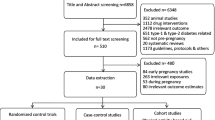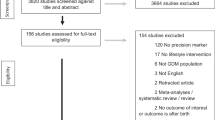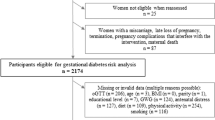Key Points
-
The use of dietary intervention or combined lifestyle measures does not seem to reduce the risk of developing gestational diabetes mellitus (GDM) in women with no defined risk factors, but the evidence for increasing physical activity is conflicting
-
Dietary intervention can reduce the risk of developing GDM and the proportion of infants born with macrosomia in pregnant women with obesity; physical activity interventions have not had the same effect
-
Combined lifestyle modifications have reduced gestational weight gain in pregnant women with obesity and have improved certain materno–fetal outcomes even if hyperglycaemia is not improved
-
In individuals at high risk of developing GDM, preliminary data have demonstrated that probiotic and myoinositol supplementation might reduce the incidence of GDM
-
The use of metformin does not seem to improve the incidence of GDM in either pregnant women with obesity or those with polycystic ovary syndrome.
Abstract
The overall incidence of gestational diabetes mellitus (GDM) is increasing worldwide. Preventing pathological hyperglycaemia during pregnancy could have several benefits: a reduction in the immediate adverse outcomes during pregnancy, a reduced risk of long-term sequelae and a decrease in the economic burden to healthcare systems. In this Review we examine the evidence supporting lifestyle modification strategies in women with and without risk factors for GDM, and the efficacy of dietary supplementation and pharmacological approaches to prevent this disease. A high degree of heterogeneity exists between trials so a generalised recommendation is problematic. In population studies of dietary or combined lifestyle measures, risk of developing GDM is not improved and those involving a physical activity intervention have yielded conflicting results. In pregnant women with obesity, dietary modification might reduce fetal macrosomia but in these patients, low compliance and no significant reduction in the incidence of GDM has been observed in trials investigating physical activity. Supplementation with probiotics or myoinositol have reduced the incidence of GDM but confirmatory studies are still needed. In randomized controlled trials, metformin does not prevent GDM in certain at-risk groups. Given the considerable potential for reducing disease burden, further research is needed to identify strategies that can be easily and effectively implemented on a population level.
This is a preview of subscription content, access via your institution
Access options
Subscribe to this journal
Receive 12 print issues and online access
$209.00 per year
only $17.42 per issue
Buy this article
- Purchase on Springer Link
- Instant access to full article PDF
Prices may be subject to local taxes which are calculated during checkout

Similar content being viewed by others
References
American Diabetes Association. Standards of medical care in diabetes — 2016. Diabetes Care 39, 1–119 (2016).
The Hyperglycaemia Study Cooperative Research Group. Hyperglycemia and adverse pregnancy outcomes. N. Engl. J. Med. 358, 1991–2002 (2008).
Yang, X. et al. Women with impaired glucose tolerance during pregnancy have significantly poor pregnancy outcomes. Diabetes Care 25, 1619–1624 (2002).
Hillier, T. et al. Childhood obesity and metabolic imprinting: the ongoing effects of maternal hyperglycemia. Diabetes Care 30, 2287–2292 (2007).
Crowther, C. A. et al. Effect of treatment of gestational diabetes mellitus on pregnancy outcomes. N. Engl. J. Med. 352, 2477–2486 (2005).
Landon, M. B. et al. A multicenter, randomized trial of treatment for mild gestational diabetes. N. Engl. J. Med. 361, 1339–1348 (2009).
Gillespie, P., Cullinan, J., O'Neill, C. & Dunne, F. Modeling the independent effects of gestational diabetes mellitus on maternity care and costs. Diabetes Care 36, 1111–1116 (2013).
Di Cianni, G., Miccoli, R., Volpe, L., Lencioni, C. & Del Prato, S. Intermediate metabolism in normal pregnancy and in gestational diabetes. Diabetes Metab. Res. Rev. 19, 259–270 (2003).
Catalano, P. M. Obesity, insulin resistance, and pregnancy outcome. Reproduction 140, 365–371 (2010).
Catalano, P. M., Tyzbir, E. D., Roman, N. M., Amini, S. B. & Sims, E. A. H. Longitudinal changes in insulin release and insulin resistance in nonobese pregnant women. Am. J. Obstet. Gynecol. 165, 1667–1672 (1991).
Catalano, P. M. et al. Longitudinal changes in basal hepatic glucose production and suppression during insulin infusion in normal pregnant women. Am. J. Obstet. Gynecol. 167, 913–919 (1992).
Buchanan, T. A., Xiang, A. H. & Page, K. A. Gestational diabetes mellitus: risks and management during and after pregnancy. Nat. Rev. Endocrinol. 8, 639–649 (2012).
Bellamy, L., Casas, J., Hingarani, A. D. & Williams, D. Type 2 diabetes mellitus after gestational diabetes: a systematic review and meta-analysis. Lancet 373, 1773–1779 (2009).
Kahn, S. E., Cooper, M. E. & Del Prato, S. Pathophysiology and treatment of type 2 diabetes: perspectives on the past, present, and future. Lancet 383, 1068–1083 (2014).
Martin, B. & Warram, J. Role of glucose and insulin resistance in development of type 2 diabetes mellitus: results of a 25-year follow-up study. Lancet 340, 925 (1992).
Buchanan, T. Pancreatic β-cell defects in gestational diabetes: implications for the pathogenesis and prevention of type 2 diabetes. J. Clin. Endocrinol. Metab. 86, 989–993 (2001).
Lapolla, A. et al. Early detection of insulin sensitivity and β-cell function with simple tests indicates future derangements in late pregnancy. J. Clin. Endocrinol. Metab. 93, 876–880 (2008).
McLachlan, K. A., Boston, R. & Alford, F. P. Impaired non-esterified fatty acid suppression to intravenous glucose during late pregnancy persists postpartum in gestational diabetes: a dominant role for decreased insulin secretion rather than insulin resistance. Diabetologia 48, 1373–1379 (2005).
Zhang, C. & Ning, Y. Effect of dietary and lifestyle factors on the risk of gestational diabetes: review of epidemiologic evidence. Am. J. Clin. Nutr. 94, 1975S–1979S (2011).
Chu, S. Y. et al. Maternal obesity and risk of gestational diabetes mellitus. Diabetes Care 30, 2070–2076 (2007).
Moses, G. M. et al. Effect of a low-glycemic-index diet during pregnancy on obstetric outcomes. Am. J. Clin. Nutr. 84, 807–812 (2006).
Cordero, Y., Mottola, M. F., Vargas, J., Blanco, M. & Barakat, R. Exercise is associated with a reduction in gestational diabetes mellitus. Med. Sci. Sports Exerc. 47, 1328–1333 (2015).
Rasmussen, K. M. & Yaktine, A. L. (eds) Weight Gain During Pregnancy: Reexamining The Guidelines (National Academies Press, 2009).
National Diabetes Data Group. Classification and diagnosis of diabetes mellitus and other categories of glucose intolerance. Diabetes 28, 1039–1057 (1979).
Stafne, S. N. et al. Regular exercise during pregnancy to prevent gestational diabetes: a randomized controlled trial. Obstet. Gynecol. 119, 29–36 (2012).
Alberti, K. & Zimmet, P. Definition, diagnosis and classification of diabetes mellitus and its complications. Part 1: diagnosis and classification of diabetes mellitus provisional report of a WHO consultation. Diabet. Med. 15, 539–553 (1998).
Asbee, S. et al. Preventing excessive weight gain during pregnancy through dietary and lifestyle counseling: a randomized controlled trial. Obstet. Gynecol. 113, 305–311 (2009).
Jolly, M. C., Sebire, N. J., Harris, J. P., Regan, L. & Robinson, S. Risk factors for macrosomia and its clinical consequences: a study of 350,311 pregnancies. Eur. J. Obstet. Gynecol. Reprod. Biol. 111, 9–14 (2003).
Clausen, T. et al. Maternal anthropemetric and metabolic factors in the first half of pregnancy and risk of neonatal macrosomia in term pregnancies. A prospective study. Eur. J. Endocrinol. 153, 887–894 (2005).
Brunner, S. et al. Excessive gestational weight gain prior to glucose screening and the risk of gestational diabetes: a meta-analysis. Diabetologia 58, 2229–2237 (2015).
Black, R. E. et al. Maternal and child undernutrition and overweight in low-income and middle-income countries. Lancet 382, 427–451 (2013).
Heslehurst, N. et al. Trends in maternal obesity incidence rates, demographic predictors, and health inequalities in 36,821 women over a 15-year period. BJOG 114, 187–194 (2007).
Chu, S. Y., Kim, S. Y. & Bish, C. L. Prepregnancy obesity prevalence in the United States, 2004–2005. Matern. Child Health J. 13, 614–620 (2009).
Wolff, S., Legarth, J., Vangsgaard, K., Toubro, S. & Astrup, A. A randomized trial of the effects of dietary counseling on gestational weight gain and glucose metabolism in obese pregnant women. Int. J. Obes. 32, 495–501 (2008).
Thornton, Y. S., Smarkola, C., Kopacz, S. M. & Ishoof, S. B. Perinatal outcomes in nutrionally monitored obese pregnant women J. Natl Med. Assoc. 101, 569–577 (2009).
Quinlivan, J. A., Lam, L. T. & Fisher, J. A randomised trial of a four-step multidisciplinary approach to the antenatal care of obese pregnant women. Aust. N. Z. J. Obstet. Gynaecol. 51, 141–146 (2011).
Thangaratinam, S. et al. Effects of interventions in pregnancy on maternal weight and obstetric outcomes: meta-analysis of randomised evidence. BMJ 344, e2088 (2012).
Dodd, J. M. et al. Antenatal lifestyle advice for women who are overweight or obese: LIMIT randomised trial. BMJ 348, g1285 (2014).
Callaway, L. K. et al. Prevention of gestational diabetes: feasibility issues for an exercise intervention in obese pregnant women. Diabetes Care 33, 1457–1459 (2010).
Chasan-Taber, L. et al. Development and validation of a pregnancy physical activity questionnaire. Med. Sci. Sports Exercise 36, 1750–1760 (2004).
Martin, F. The diagnosis of gestational diabetes. Med. J. Aust. 1991, 112 (1991).
Oostdam, N. et al. No effect of the FitFor2 exercise programme on blood glucose, insulin sensitivity, and birthweight in pregnant women who were overweight and at risk for gestational diabetes: results of a randomised controlled trial. BJOG 119, 1098–1107 (2012).
Poston, L. et al. Effect of a behavioural intervention in obese pregnant women (the UPBEAT study): a multicentre, randomised controlled trial. Lancet Diabetes Endocrinol. 10, 767–777 (2015).
Koivusalo, S. B. et al. Gestational diabetes mellitus can be prevented by lifestyle intervention: the finnish gestational diabetes prevention study (RADIEL): a randomized controlled trial. Diabetes Care 39, 24–30 (2015).
International Association of Diabetes and Pregnancy Study Groups Consensus Panel. International association of diabetes and pregnancy study groups recommendations on the diagnosis and classification of hyperglycemia in pregnancy. Diabetes Care 33, 676–682 (2010).
McGiveron, A. et al. Limiting antenatal weight gain improves maternal health outcomes in severely obese pregnant women: findings of a pragmatic evaluation of a midwife-led intervention. J. Hum. Nutr. Diet. 28 (Suppl. 1), 29–37 (2015).
Renault, K. M. et al. The Treatment of Obese Pregnant Women (TOP) study: a randomized controlled trial of the effect of physical activity intervention assessed by pedometer with or without dietary intervention in obese pregnant women. Am. J. Obstet. Gynecol. 210, 134.e1–134.e9 (2014).
Vinter, C. A., Jensen, D. M., Ovesen, P., Beck-Nielsen, H. & Jorgensen, J. S. The LiP (Lifestyle in Pregnancy) study: a randomized controlled trial of lifestyle intervention in 360 obese pregnant women. Diabetes Care 34, 2502–2507 (2011).
Simmons, D. et al. Results from a European multicenter randomized trial of physical activity and/or healthy eating to reduce the risk of gestational diabetes mellitus: The DALI Lifestyle Pilot. Diabetes Care 38, 1650–1656 (2015).
Harrison, C. L., Lombard, C. B., Strauss, B. J. & Teede, H. J. Optimizing healthy gestational weight gain in women at high risk of gestational diabetes: a randomized controlled trial. Obesity 21, 904–909 (2013).
Hui, A. B. et al. Effects of lifestyle intervention on dietary intake, physical activity level, and gestational weight gain in pregnant women with different pre-pregnancy Body Mass Index in a randomized control trial. BMC Pregnancy Childbirth 14, 331 (2014).
National Collaborating Centre for Women's and Children's Health (UK) in Diabetes in Pregnancy: Management of Diabetes and its Complications From Preconception to the Postnatal Period 1–680 (RCOG Press, 2015).
Luoto, R. et al. Primary prevention of gestational diabetes mellitus and large-for-gestational-age newborns by lifestyle counseling: a cluster-randomized controlled trial. PLoS Med. 8, e1001036 (2011).
Walsh, J. M. et al. Low glycaemia index diet in pregnancy to prevent macrosomia (ROLO study): randomised control trial. BMJ 345, e5605 (2012).
Carpenter, M. W. & Coustan, D. R. Criteria for screening tests for gestational diabetes. Am. J. Obstet. Gynecol. 144, 768–773 (1982).
Markovic, T. P. et al. Randomized controlled trial investigating the effects of a low-glycemic index diet on pregnancy outcomes in women at high risk of gestational diabetes mellitus: the GI Baby 3 Study. Diabetes Care 39, 31–38 (2016).
Hoffman, L., Nolan, C., Wilson, J. D., Oats, J. J. N. & Simmons, D. Gestational diabetes mellitus-management guidelines. The Australasian Diabetes in Pregnancy Society. Med. J. Aust. 169, 93–97 (1998).
The Diabetes Prevention Program Research Group. Reduction in the incidence of type 2 diabetes with lifestyle intervention or metformin. N. Engl. J. Med. 346, 393–403 (2002).
Wellings, K. et al. The prevalence of unplanned pregnancy and associated factors in Britain: findings from the third National Survey of Sexual Attitudes and Lifestyles (Natsal-3). Lancet 382, 1807–1816 (2013).
Inskip, H. M. et al. Women's compliance with nutrition and lifestyle recommendations before pregnancy: general population cohort study. BMJ 338, b481 (2009).
Lombardo, Y. B. & Chicco, A. G. Effects of dietary polyunsaturated n-3 fatty acids on dyslipidemia and insulin resistance in rodents and humans. A review. J. Nutr. Biochem. 17, 1–13 (2006).
Zhou, S. J. et al. Fish-oil supplementation in pregnancy does not reduce the risk of gestational diabetes or preeclampsia. Am. J. Clin. Nutr. 95, 1378–1384 (2012).
Ruan, Y. et al. Effect of probiotics on glycemic control: a systematic review and meta-analysis of randomized, controlled trials. PLoS ONE 10, e0132121 (2015).
Gohir, W., Ratcliffe, E. M. & Sloboda, D. M. Of the bugs that shape us: maternal obesity, the gut microbiome, and long-term disease risk. Pediatr. Res. 77, 196–204 (2015).
Luoto, R., Laitinen, K., Nermes, M. & Isolauri, E. Impact of maternal probiotic-supplemented dietary counselling on pregnancy outcome and prenatal and postnatal growth: a double-blind, placebo-controlled study. Br. J. Nutr. 103, 1792–1799 (2010).
Metzger, B. E. & Coustan, D. R. Summary and recommendations of the Fourth International Workshop-Conference on Gestational Diabetes Mellitus. The Organizing Committee. Diabetes Care 21, B161–B167 (1998).
Corrado, F. et al. The effect of myoinositol supplementation on insulin resistance in patients with gestational diabetes. Diabet. Med. 28, 972–975 (2011).
D'Anna, R. et al. Myo-inositol supplementation and onset of gestational diabetes mellitus in pregnant women with a family history of type 2 diabetes: a prospective, randomized, placebo-controlled study. Diabetes Care 36, 854–857 (2013).
D'Anna, R. et al. Myo-inositol supplementation for prevention of gestational diabetes in obese pregnant women: a randomized controlled trial. Obstet. Gynecol. 126, 310–315 (2015).
Matarrelli, B. et al. Effect of dietary myo-inositol supplementation in pregnancy on the incidence of maternal gestational diabetes mellitus and fetal outcomes: a randomized controlled trial. J. Matern. Fetal Neonatal Med. 26, 967–972 (2013).
Santamaria, A. et al. Myo-inositol may prevent gestational diabetes onset in overweight women: a randomized, controlled trial. J. Matern. Fetal Neonatal Med. http://dx.doi.org/10.3109/14767058.2015.1121478 (2015).
Ratner, R. E. et al. Prevention of diabetes in women with a history of gestational diabetes: effects of metformin and lifestyle interventions. J. Clin. Endocrinol. Metab. 93, 4774–4779 (2008).
Buchanan, T. et al. Preservation of pancreatic β-cell function and prevention of type 2 diabetes by pharmacological treatment of insulin resistance in high-risk Hispanic women. Diabetes 51, 2796–2803 (2002).
Gilbert, C., Valois, M. & Koren, G. Pregnancy outcome after first-trimester exposure to metformin: a meta-analysis. Fertil. Steril. 86, 658–663 (2006).
Holt, R. I. & Lambert, K. D. The use of oral hypoglycaemic agents in pregnancy. Diabet. Med. 31, 282–291 (2014).
Balsells, M. et al. Glibenclamide, metformin, and insulin for the treatment of gestational diabetes: a systematic review and meta-analysis. BMJ 350, h102 (2015).
The Rotterdam ESHRE/ASRM-Sponsored PCOS Consensus Workshop. Revised 2003 consensus on diagnostic criteria and long-term health risks related to polycystic ovary syndrome. Fertil. Steril. 81, 19–25 (2004).
Goodarzi, M. O., Dumesic, D. A., Chazenbalk, G. & Azziz, R. Polycystic ovary syndrome: etiology, pathogenesis and diagnosis. Nat. Rev. Endocrinol. 7, 219–231 (2011).
Khattab, S. et al. Can metformin reduce the incidence of gestational diabetes mellitus in pregnant women with polycystic ovary syndrome? Prospective cohort study. Gynecol. Endocrinol. 27, 789–793 (2011).
Vanky, E. et al. Metformin versus placebo from first trimester to delivery in polycystic ovary syndrome: a randomized, controlled multicenter study. J. Clin. Endocr inol. Metab. 95, E448–E455 (2010).
Chiswick, C. et al. Effect of metformin on maternal and fetal outcomes in obese pregnant women (EMPOWaR): a randomised, double-blind, placebo-controlled trial. Lancet Diabetes Endocrinol. 3, 778–786 (2015).
Syngelaki, A. et al. Metformin versus placebo in obese pregnant women without diabetes mellitus. N. Engl. J. Med. 374, 434–443 (2016).
Zhang, C., Solomon, C. G., Manson, J. E. & Hu, F. B. A. Prospective study of pregravid physical activity and sedentary behaviors in relation to the risk for gestational diabetes mellitus. Arch. Intern. Med. 166, 543–548 (2006).
Schoenaker, D. A. J. M., Mishra, G. D., Calalway, L. K. & Soedamah-Muthu, S. S. The role of energy, nutrients, foods, and dietary patterns in the development of gestational diabetes mellitus: a systematic review of observational studies. Diabetes Care 39, 16–23 (2016).
Tobias, D. K., Zhang, C., van Dam, R. M., Bowers, K. & Hu, F. B. Physical activity before and during pregnancy and risk of gestational diabetes mellitus: a meta-analysis. Diabetes Care 34, 223–229 (2011).
Zhang, C. et al. Adherence to healthy lifestyle and risk of gestational diabetes mellitus: prospective cohort study. BMJ 349, g5450 (2014).
Canadian Diabetes Association Clinical Practice Guidelines Expert Committee. 2008 clinical practice guidelines for the prevention and management of diabetes in Canada. Can. J. Diabetes Care 32, 171 (2008).
Acknowledgements
The authors wish to acknowledge support from the Novo Nordisk UK Research Charitable Foundation for a clinical research fellowship awarded to R.A.-J.
Author information
Authors and Affiliations
Contributions
R.A.-J. and S.R. researched data for the article. R.A.-J.wrote the manuscript. All authors made substantial contribution to discussion of the content, and reviewed and edited the manuscript before submission.
Corresponding author
Ethics declarations
Competing interests
The authors declare no competing financial interests.
Rights and permissions
About this article
Cite this article
Agha-Jaffar, R., Oliver, N., Johnston, D. et al. Gestational diabetes mellitus: does an effective prevention strategy exist?. Nat Rev Endocrinol 12, 533–546 (2016). https://doi.org/10.1038/nrendo.2016.88
Published:
Issue Date:
DOI: https://doi.org/10.1038/nrendo.2016.88
This article is cited by
-
Fruit, vegetable, and fruit juice consumption and risk of gestational diabetes mellitus: a systematic review and meta-analysis
Nutrition Journal (2023)
-
Prävention des Gestationsdiabetes
Die Diabetologie (2023)
-
Pre-pregnancy menstrual cycle regularity and length and the risk of gestational diabetes mellitus: prospective cohort study
Diabetologia (2021)
-
Association between maternal triglycerides and disturbed glucose metabolism in pregnancy
Acta Diabetologica (2021)
-
Polymorphisms of TGF-β1 and TGF-β3 in Chinese women with gestational diabetes mellitus
BMC Pregnancy and Childbirth (2020)



